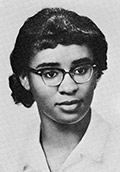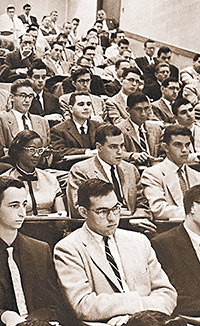

Remembering a Pioneer
Dr. Carol Burnett: Changing the Face of Medicine
The commitment to diversity is embedded in Einstein's DNA. The College of Medicine was founded on the promise that "students of all races, religions and creeds" would be welcomed. Over the decades, many alumni have proved the wisdom of such principles. One distinguished graduate of note, Dr. Carol E. Burnett, class of 1960, not only embodied these values, but spent her career promoting and implementing them. Dr. Burnett, a member of Einstein's second graduating class, passed away this January.

Carol E. Burnett, M.D. '60At a time when women, blacks and Jews were not welcome at most American medical schools, Dr. Burnett became the first African American and one of the first women to graduate from Einstein. She went on to become a respected pediatrician, a trailblazer for diversity in medical education and a leader in the fight against health disparities.
Early Life and Inspiration
Born on March 11, 1935, to British West Indian parents who settled in the South Bronx, Carol Eudine Burnett excelled at school and spent many hours in the library. There she discovered Microbe Hunters, a book about great scientists like Marie Curie and Louis Pasteur. Their stories inspired her, as did her uncle, a physician.
She was accepted to the selective all-girls Hunter High School in Manhattan, one of four black students in a class of 32. From there she went to the city's prestigious all-female Hunter College, where her love for science blossomed. During her junior year, she had her first female science professor, Dr. Gertrude Wertenbacher, who became her role model and mentor, and encouraged her to pursue a career in medicine.
Choosing a Medical School
Concerned by stories she'd heard about virulent racism in the south and reluctant to leave her parents, she rejected the idea of attending a southern black medical school or a medical college for women in Philadelphia. Instead, she took Dr. Wertenbacher's advice and applied to every medical school in New York City. She was accepted at Einstein and Downstate.
Her Einstein interviewers—Dr. Lewis Fraad, professor of pediatrics, and Dr. Gertie Marx, professor of anesthesiology—made a strong impression. Einstein was a brand new institution that welcomed gifted students of all backgrounds and was committed to helping them succeed. It also was a short bus ride from her parents' home.
A Welcoming Place

Dr. Burnett was one of only four women, and the only person of color, in the class of 1960After graduating Hunter Phi Beta Kappa, with a B.S. in chemistry, in 1956, she entered Einstein. Dr. Irwin Dannis, who recently retired as a co-chair of admissions at Einstein, fondly recalls his classmate and friend: "Carol and I were at neighboring tables in anatomy lab. After class, a group of us would go to the coffee shop across the street. We were like brothers and sisters."
The welcome Dr. Burnett received at Einstein shaped the vision she would use later, in the programs she helped create, observed Dr. Ed Poliandro, a close friend and colleague at the Icahn School of Medicine at Mount Sinai.
Caring Physician, Passionate Advocate
Dr. Burnett loved children. She began a pediatric residency at Los Angeles Children's Hospital, but encountered discrimination. So she returned to New York and completed her residency at the then Einstein-affiliated Lincoln Hospital. She became board certified in pediatrics in 1970.
She joined the Mount Sinai faculty in 1973. As Mount Sinai's first black assistant dean for admissions and minority affairs—a position she held until her retirement in 2000—"she made it known that her goal was to change the ‘face' of medicine," said Dr. Poliandro.
In 1992, she co-founded the Mount Sinai School of Medicine Cultural Diversity in Medicine Program (the precursor to Mount Sinai's Center for Multicultural and Community Affairs), to teach students the art of culturally sensitive medical practice. She was also a founder of the Northeast Consortium on Cross Cultural Medical Education and Practice, which develops curriculum and policy.
In addition, as a longtime member of the Minority Affairs section of the Association of American Medical Colleges, she worked to help minority students gain admission to and stay in medical school.
A Magnificent Journey
Early in her career, Dr. Burnett was at times mistaken for a cleaning lady or nurse's aide. "She was so brilliant and so competent, yet she had to prove herself, over and over," said Dr. Poliandro. But, he noted, those experiences informed her activism.
Dr. Burnett travelled the world, crossing bridges into many cultures. "Carol could relate to any cultural group. She made it a point to speak a few words in the language of the people she met," recalled Jeanette Brown, her good friend and frequent travel companion.
"Her life was a magnificent journey," added Dr. Poliandro. "Doing the work she did was like the loneliness of the long distance runner. To be joined by other people in the fight was so important to her." In her later years, he said, she took joy in the love and support she received.
Dr. Burnett's favorite poet, Maya Angelou, once wrote: "Be sure that you do not die without having done something wonderful for humanity." As her remarkable life attests, Dr. Burnett heeded that advice.
Editor's Note: For those interested, Dr. Burnett's life and work are further detailed in the Summer 2003 issue of E=MD2, The Magazine for the Alumni of Albert Einstein College of Medicine. Also see Jeanette Brown's biography of Dr. Burnett in African American National Biography, available in many libraries or online by subscription at www.oxfordaasc.com.
Posted on: Wednesday, March 12, 2014

Tablet Blog